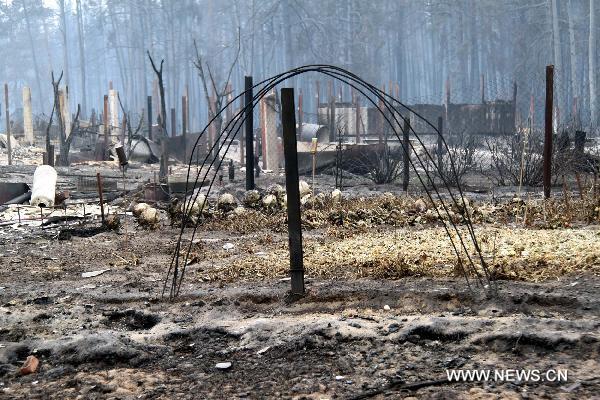Central Russia blanketed in smog as wildfires continue
The highway leading to the Vladimir region east of Moscow, where wildfire has been raging for days, is blanketed in smoke, which turns thicker and thicker with every mile of driving.
 |
|
The burnt cottage is pictured after a forest fire in a village some 150 kilometers south of Moscow, capital of Russia, Aug. 2, 2010. Russian President Dmitry Medvedev on Monday declared emergency state in seven regions engulfed by wildfires that have claimed at least 34 people and left thousands of others homeless.[Wei Dafang/Xinhua] |
Approaching the town of Noginsk, where the Russian Emergency Ministry's principal base is located, drivers have to turn on their cars' fog lamps and switch the air conditioners to internal circulation mode, in order to prevent the turbid smoke from coming in.
It is difficult to see through the smog, and it is hard to breathe outside.
Actually, many drivers have opted to make a U-turn there, some 67 km east of the Russian capital, trying to bypass the area via some side roads.
It is still a tricky task. Many side roads have been ditched, to stop cars from getting into unsafe areas in the woods, after Russian Prime Minister Vladimir Putin demanded governors of the fire-stricken regions to restrain residents from visiting the forests.
"Citizens' negligence costs too much for us," said Putin.
And for tens of thousands of local residents, there is no place to escape or switch to. According to the Health Ministry, the number of people killed by the fire in six regions has so far climbed up to 40.
Russian President Dmitry Medvedev on Monday declared a state of emergency in seven regions engulfed by the wildfires, and restricted citizens' entries to certain areas.
All the regions were in the central part of Russia, including Moscow, Vladimir, Nizhny Novgorod, Mariy El, Mordovia, Voronezh and Ryazan.
"Thousands of our citizens lost everything in the blink of an eye. This is a terrible tragedy," Medvedev wrote in his blog.
Even before the presidential decree, some local authorities have already tried to keep people away from the forests.
However, all the government measures seem to be weak and insufficient in the face of the raging blazes.
Twenty-four more people died in the wildfires in the Volga region on Monday, Grigory Rapota, the presidential representative to the region, was quoted as saying by local media.
In the region of Nizhny Novgorod, some 400 km east of Moscow, the international airport has been closed at least until Tuesday because of heavy smoke posing a threat to safe landing.
Fifty more houses were burnt to ashes in the Lipetsk region the same day, according to Russian Emergency Situations Minister Sergei Shoigu.
The Emergency Situations Ministry announced on Monday it was going to purchase eight planes specially equipped with fire- fighting machinery, and to assemble a fire extinguishing equipment on the Defense Ministry's planes and helicopters.
Deputy Chairman of the State Duma Vladimir Zhirinovsky, well- known for his flamboyant remarks, urged his colleagues to cut short their summer breaks and travel to those fire-affected regions.
According to the latest estimation from the Regional Development Ministry, the total compensation for those who lost their homes in the fires will reach 6.4 billion rubles (212 million U.S. dollars), up from the previously estimated 166 million dollars.
Meteorologists warned that the fire-incited fog in Moscow may stay for at least one more week.
 0
0 







Go to Forum >>0 Comments